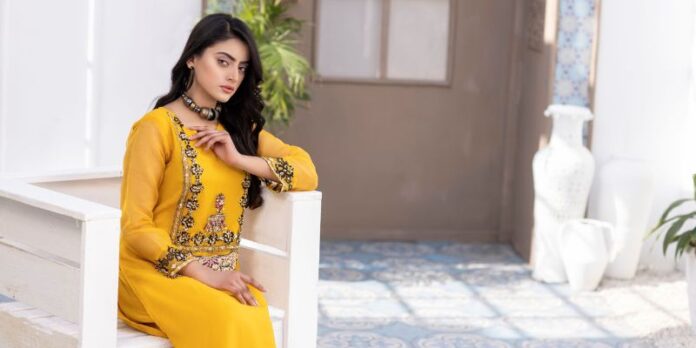Pakistani fashion is celebrated for its rich heritage, intricate craftsmanship, and the elegance of its designer collections. As Pakistani designer clothes become more accessible worldwide, it’s essential to ensure you’re purchasing authentic pieces. With the rise of counterfeit products, many customers face challenges when identifying genuine designer dresses. In this guide, we’ll explore the key factors to look for when spotting authentic Pakistani designer clothes, helping you invest in high-quality, original outfits.
Understanding the Appeal of Pakistani Designer Clothes
Pakistani fashion designers are known for their attention to detail, use of premium fabrics, and artistic embellishments. Whether it’s a luxurious formal dress or an everyday chic outfit, Pakistani designer clothes combine traditional craftsmanship with modern designs, making them sought after across the globe.
Look for Authentic Brand Labels and Tags
One of the easiest ways to verify the authenticity of Pakistani designer clothes is by checking the brand’s labels and tags. Authentic dresses from well-known designers come with specific tags that include the designer’s name, logo, and sometimes a unique code for that collection. These labels are typically stitched onto the garment and are an integral part of the designer’s branding.
Counterfeit dresses may have poorly printed or incorrect labels, and in some cases, the labels might be entirely missing. Always inspect the label’s quality—authentic designer tags will be made of durable materials, whereas fake ones might feel flimsy or cheap.
Examine the Quality of Fabric and Craftsmanship
The quality of the fabric and the craftsmanship are strong indicators of whether a dress is authentic or not. Pakistani designers are known for using luxurious materials such as silk, chiffon, velvet, and organza. These fabrics are not only visually appealing but also comfortable and long-lasting.
Authentic Pakistani designer clothes often feature intricate hand embroidery, detailed embellishments, and precise stitching. Counterfeit versions may use lower-quality fabrics and have poorly done embroidery or uneven stitching. When examining a designer dress, look closely at the details—authentic pieces will have flawless craftsmanship with no loose threads or uneven patterns.
Verify the Source or Retailer
Where you purchase Pakistani designer clothes plays a significant role in ensuring authenticity. Reputable online retailers and physical stores that specialize in Pakistani fashion are more likely to sell genuine designer pieces. For instance, platforms like Kaarighar offer a range of authentic Pakistani designer dresses from well-known brands.
Avoid purchasing from unknown online sellers or marketplaces that offer steep discounts, as these are often red flags for counterfeit products. Always check customer reviews and ratings of the store to gauge its reliability. Authentic retailers will also offer return and exchange policies, giving you confidence in your purchase.
Check the Price
While Pakistani designer clothes can vary in price depending on the designer and the collection, one thing to remember is that genuine designer dresses are typically priced higher due to the quality of materials and craftsmanship involved. If a price seems too good to be true, it’s likely a counterfeit.
That said, be wary of discounts that seem disproportionately large. Authentic designer brands may offer seasonal sales or promotions, but extreme discounts often indicate that the product is fake. Always compare prices from multiple trusted sources before making a purchase.
Pay Attention to Collection Releases
Pakistani designers often release their collections in seasons, with specific pieces tied to particular years and events, such as Eid or wedding collections. Knowing the designer’s latest collections and release timelines can help you verify whether the dress you’re interested in is authentic. Counterfeit manufacturers often produce replicas of popular designs, but they may be outdated or not aligned with the designer’s current collection.
By staying updated on new collection releases, you can cross-reference the dress you want with what’s currently being offered by the brand. Designer websites or authorized retailers will often showcase the latest collections, helping you spot fakes that are trying to replicate old designs.
Seek Authenticity Certificates or Cards
Some luxury Pakistani designers provide authenticity certificates or cards with their dresses. These are often found in high-end formal or bridal collections. The certificate typically includes information about the garment and the designer’s verification of its originality.
When purchasing expensive or exclusive Pakistani designer clothes, always ask if the retailer provides any form of authenticity proof. If the seller is unable to offer this, it’s worth reconsidering your purchase.
Spotting Authentic Pakistani Designer Dresses with Kaarighar
When shopping for Pakistani designer dresses, Kaarighar ensures you receive only genuine, high-quality pieces. To verify authenticity, start by checking the brand labels and tags on the dress—Kaarighar’s authentic pieces feature high-quality, durable tags with clear branding. Examine the fabric and craftsmanship closely; genuine Kaarighar dresses use luxurious materials like silk and chiffon, showcasing intricate hand embroidery and precise stitching.
Purchase exclusively from reputable sources like Kaarighar to avoid counterfeits and ensure you get the latest collections. Always be cautious of unusually low prices and verify with authenticity certificates if available. With Kaarighar, you can confidently invest in authentic Pakistani fashion.



